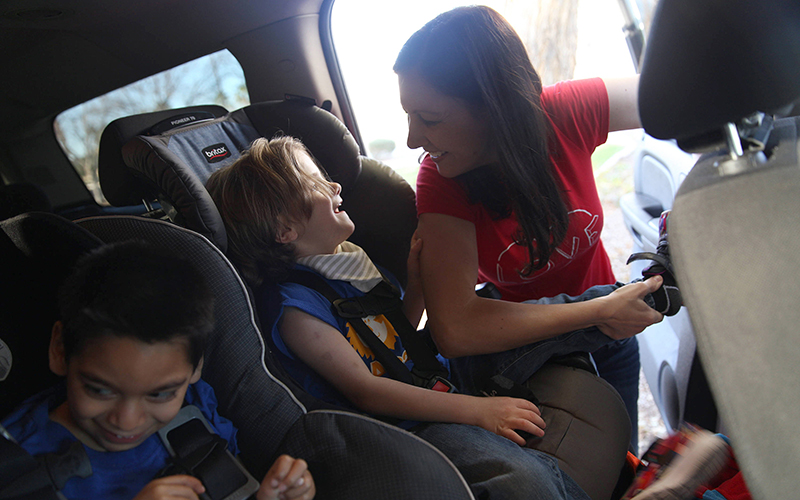
Jessika Reed, 35, helps her son Fynnland, 7, put on his shoes before going to school. Jessika is the mother of eight children, seven adopted and one biological, four of whom have special needs.
Jessika Reed has eight children, including seven who are adopted and four who have special needs. As if that wasn’t enough, Jessika has also cared for many foster kids during the past 15 years, constantly welcoming children in need into her home.
In fact, she was so eager to parent foster children that she was granted a special exception to become a foster parent before the age of 21, usually the legal minimum. The state granted her that permission at the age of 20 so she could adopt triplets born with fetal alcohol syndrome. Now, 15 years later, her family continues to grow.
“I have never ever given anybody a number of kids I actually want to adopt…I just don’t want to say it out loud,” she said. “I just have the mindset that I’m a loving parent, I can take care of these kids, so why not just open your home to one more? What’s one more? What’s one more? Because you’re giving these kids a life that maybe they’re not going to have if they just get lost in the system.”
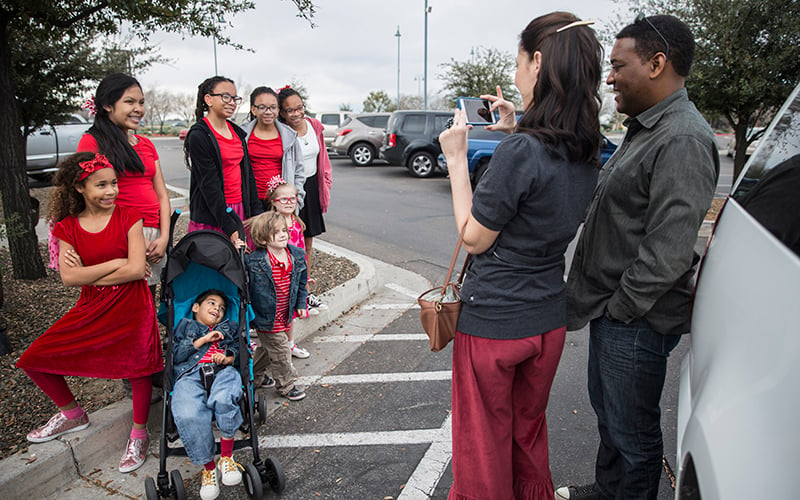
Jessika Reed stands with her boyfriend, Clark Pace, as she takes a photo of her family on Sunday, Feb. 12, 2017. (Photo by Johanna Huckeba)
As in any large family, the oldest children play a big role in helping out around the house and taking care of younger ones, and being an older sibling to small children with special needs comes with a unique set of challenges.
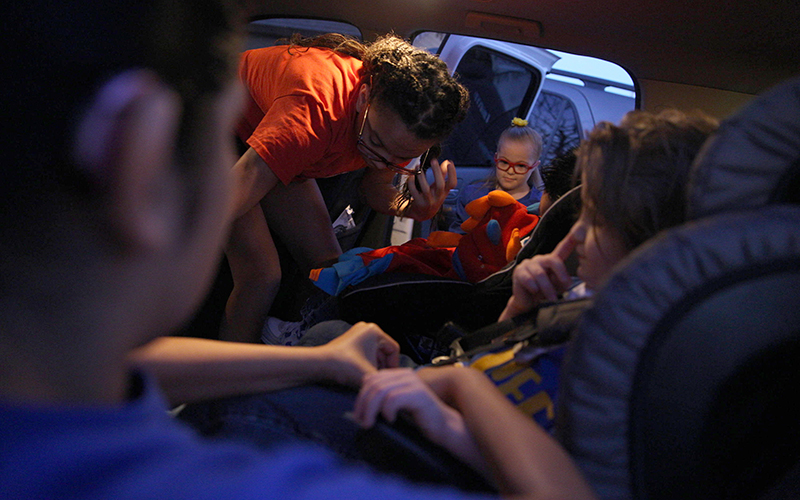
The older children help strap the younger children into their car seats as they prepare to leave for school on Friday, Feb. 10, 2017. (Photo by Johanna Huckeba/Cronkite News)
Four of Jessika’s children require special medical care and education. Zealynd, 5, has cerebral palsy. His motor skills are similar to those of an infant, and he must be fed through a gastrostomy tube five times a day.
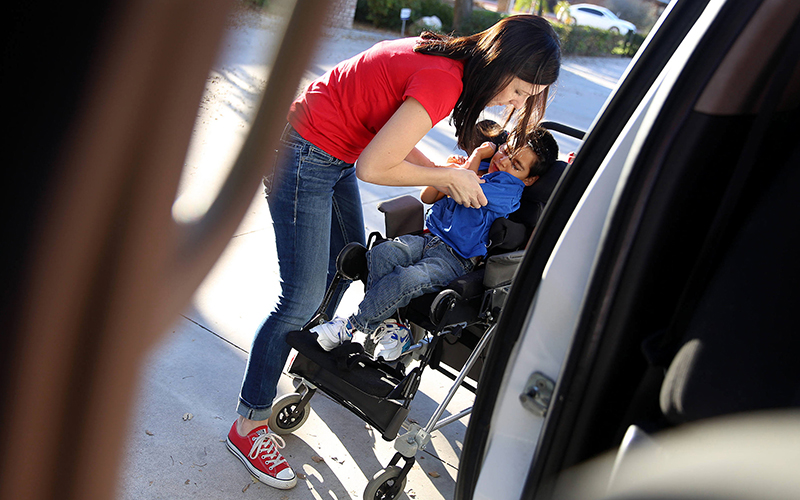
Jessika Reed transfers Zealynd, her 5-year-old adopted son with cerebral palsy, from the car to attend school on Friday, Feb. 10, 2017. (Photo by Johanna Huckeba/Cronkite News)
All four of Jessika’s children with special needs attend Lauren’s Institute for Education in Gilbert. Cassara, 12, was born missing part of her brain. She now has a cochlear implant and has some developmental delays. Parys, who is also 12 years old, and Jayden, 17 months, both have Down syndrome. Jayden is still in the foster care system and lives with his grandmother, but Jessika takes care of him during business hours.
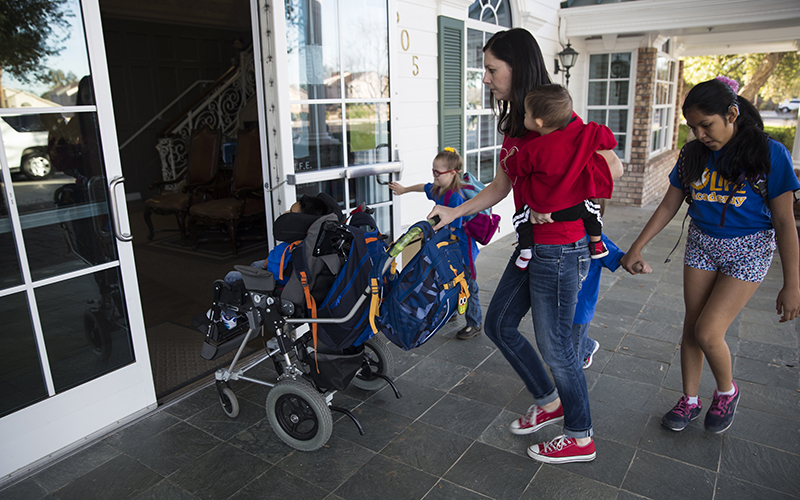
Parys, 12, holds the door for her family as they enter Lauren’s Institute for Education, where the four children with special needs go to school. Cassara, far right, holds Fynn’s hand as they walk behind their mom, who is carrying Jayden and pushing Zealynd in the stroller. (Photo by Johanna Huckeba/Cronkite News)
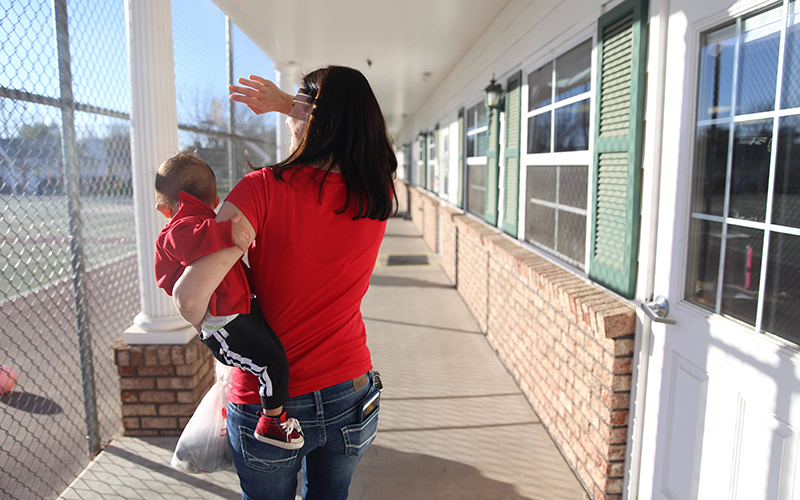
After Jessika drops off Fynn and Zealynd in their classroom, she watches to make sure Cassara and Parys safely make it to class on the other side of campus. Although only six months older than Parys, Cassara is a “good big sister” and leads Parys, who has more significant impairment, to class each day. (Photo by Johanna Huckeba/Cronkite News)
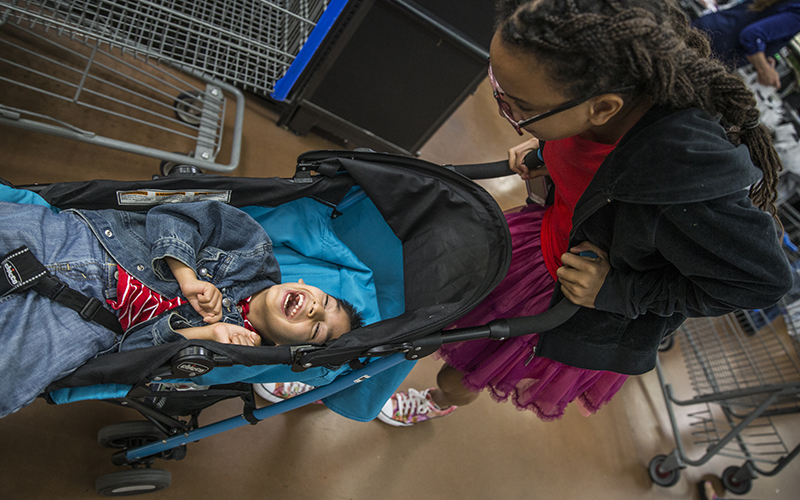
Kenyah, one of the 15-year-old triplets, plays with Zealynd during a shopping trip to Walmart on Sunday, Feb. 12, 2017. The weekends are a time for family outings, including church every Sunday and frequent visits to the Phoenix Zoo. (Photo by Johanna Huckeba/Cronkite News)
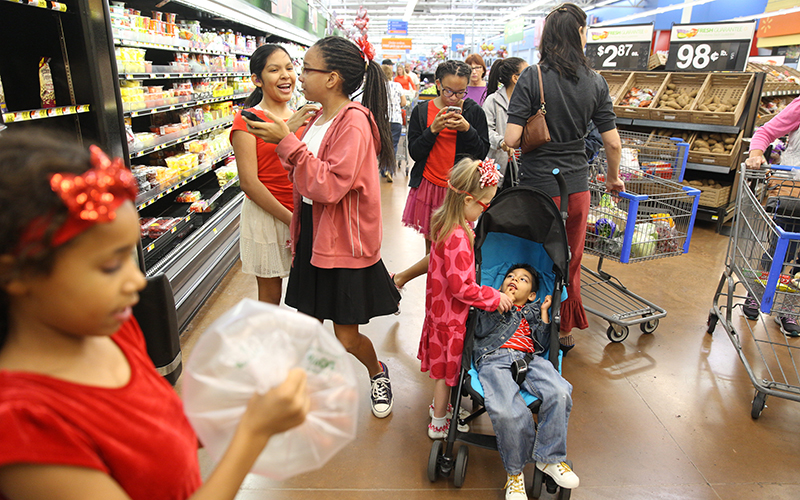
The Reed family shops for groceries after church on Sunday, Feb. 12, 2017. Feeding so many mouths adds up quickly, so fitting within a food budget is a challenge. Jessika’s main source of income comes from the state, which compensates her for the care she is providing to children with special needs who were previously in the foster care system. (Photo by Johanna Huckeba/Cronkite News)
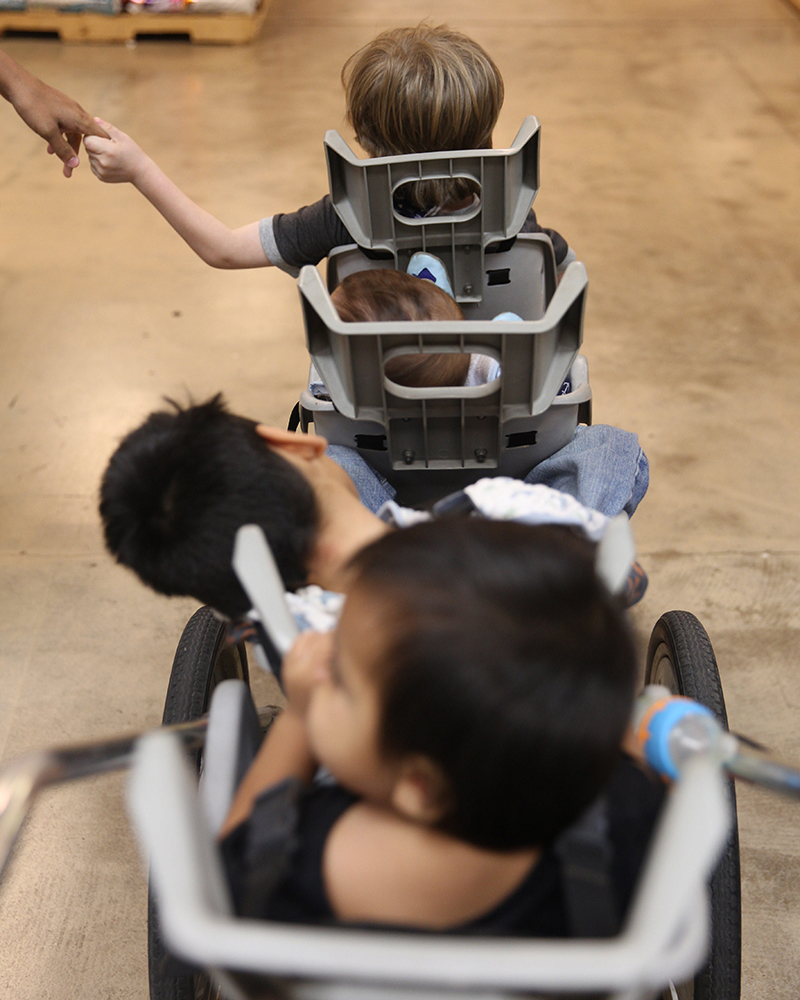
Fynnland sits at the front of the quad stroller holding his older sister’s hand during a shopping trip on Nov. 2, 2016. Behind Fynn are Jayden, Zealynd and Ched or “Little Bear,” a foster child temporarily placed in Jessika’s care. (Photo by Johanna Huckeba/Cronkite News)
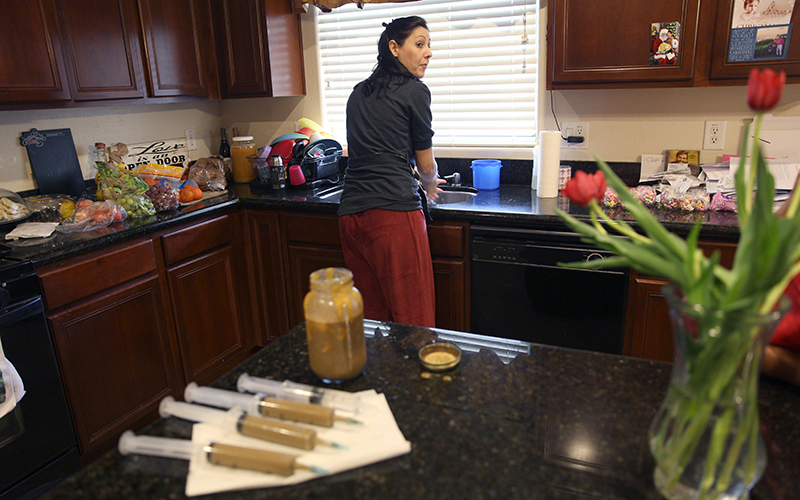
Jessika washes her hands after preparing Zealynd’s second meal of the day. Zealynd can have any combination of healthy food that can be liquified, and he sees a nutritionist to make sure he is getting a balanced diet. The jar on the counter is enough food for one day. (Photo by Johanna Huckeba/Cronkite News)
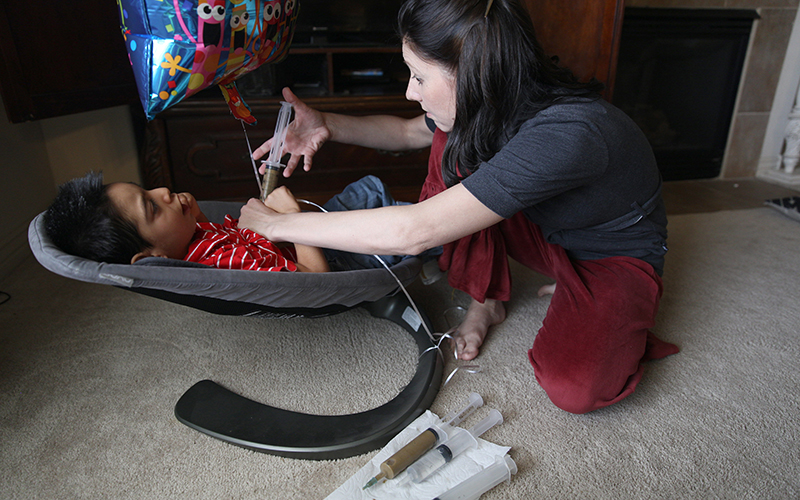
Jessika feeds Zealynd through his gastrostomy tube while Zealynd holds his birthday balloon from a few weeks prior in their home on Sunday, Feb. 12, 2017. “The more tubes and wires the better,” Jessika said and is known for saying about children in her care. As a child, one of the things Jessika aspired to be was a doctor. Now, in many ways, she gets to be one every day. (Photo by Johanna Huckeba/Cronkite News)
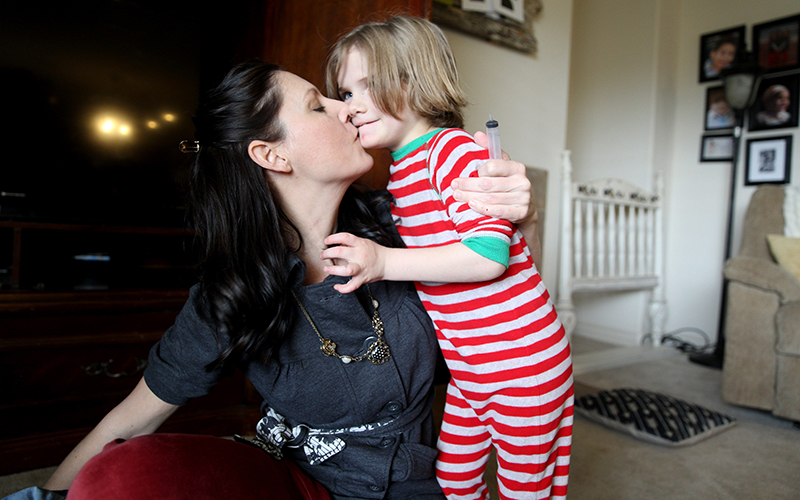
Jessika kisses her son Fynn after his afternoon nap on Sunday, Feb. 12, 2017. Jessika said that doctors believed that Fynn would never walk, communicate or function above the motor skills of an infant. Fynn does not communicate verbally currently, although he did for a time, but he communicates with sign language and is as mobile as any 7-year-old. (Photo by Johanna Huckeba/Cronkite News)
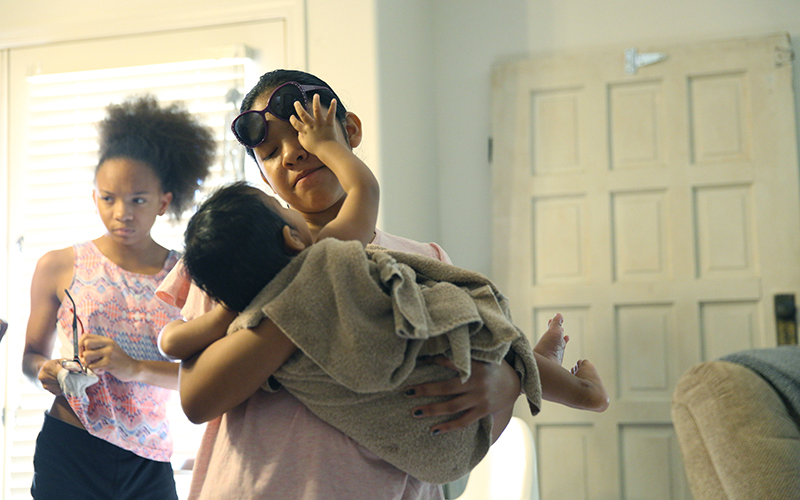
Cassara holds “Little Bear” after a bath on Nov. 2, 2016. “Little Bear” was placed with the family as a foster child by the Gila River Indian Community. Jessika had hopes of adopting him after he spent three months living with the family. (Photo by Johanna Huckeba/Cronkite News)
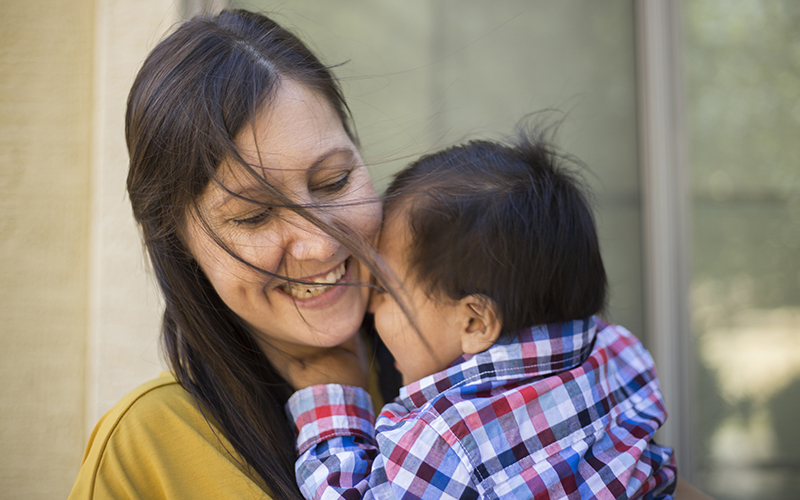
Jessika holds “Little Bear” outside of her home hours before his biological parents came to pick him up on Nov. 8, 2016. Foster parents often receive very little notice of when foster children are coming or going. Jessika had recently bought new winter clothes for him when she heard he would be leaving her care. (Photo by Johanna Huckeba/Cronkite News)
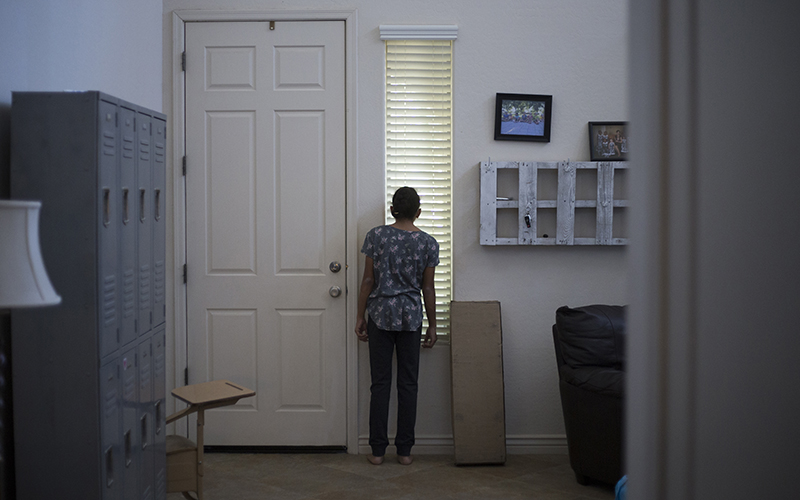
Kenyah looks out the window after “Little Bear” is picked up by his birth parents Nov. 8, 2016. The triplets were the only children home to see “Little Bear” off. (Photo by Johanna Huckeba/Cronkite News)
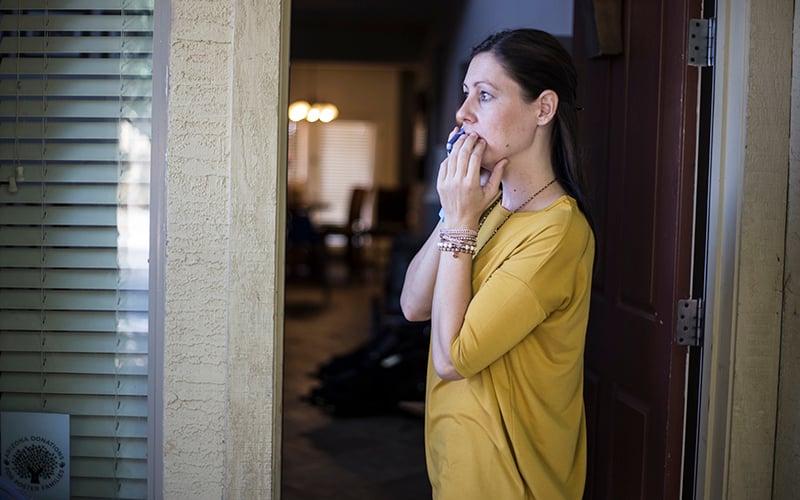
Jessika looks down the road after “Little Bear” has been picked up by his birth parents on Nov. 8, 2016. (Photo by Johanna Huckeba/Cronkite News)
Despite the emotional roller-coaster of welcoming children in and out of her home for days, weeks or months at a time, Jessika continues to take in infants and young children whenever she is needed.
“I always tell them that if you have a baby that needs a home, just bring them to me and we’ll love on them, because that’s all these kids need,” she said. “Everyone wants to put the problem off on someone else. Oh, there’s foster parents out there…Somebody needs to step-up, and I’m willing to, so I am going to do it.”